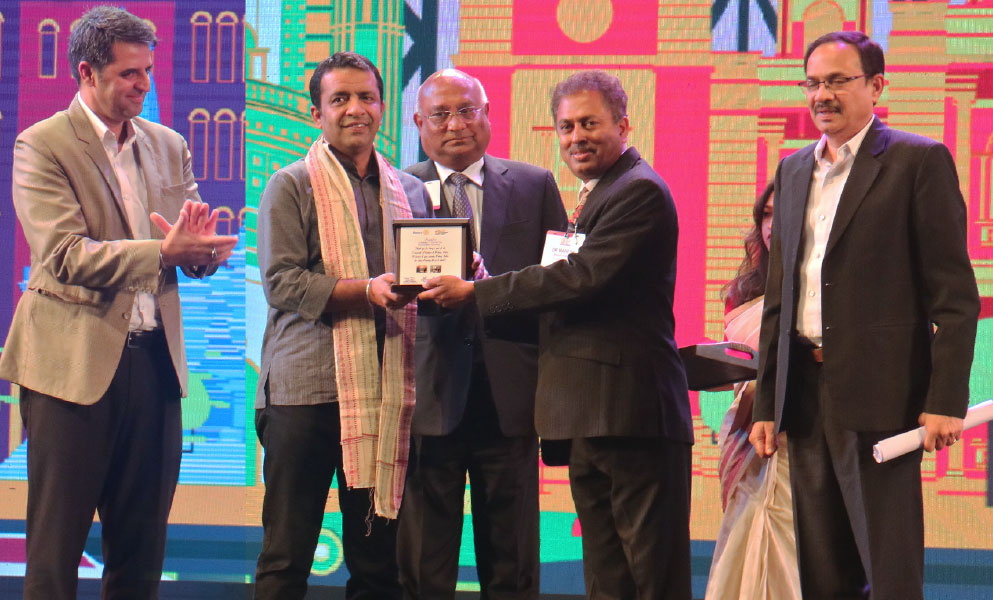
Two social entrepreneurs did not pull their punches at the Centennial Summit in Kolkata on two issues — child hunger and lack of clothing. PRID C Basker chaired the session titled ‘Growing local economies’.
While Anshu Gupta’s Goonj, a Delhi-based NGO, works in recycling urban waste and garments to provide dignity to millions of poor families, Akshaya Patra’s Chief Marketing Officer Sundeep Talwar is keen to improve the enrolment ratio in government schools through the NGO’s Midday Meal programme.
More people die for want of proper clothing than due to natural calamities in India, but there is no dearth of resources to provide decent clothing for deprived people, said Anshu Gupta. He resigned from a high corporate post, and started Goonj in 1999 to work for the betterment of marginalised people by giving them decent clothes and educating them on adopting better hygiene and sanitation.
“A person is evaluated by what he or she wears; the reality is that while higher education is highly subsidised, we take exception to farm subsidy which helps farmers earn a decent income,” he explained. In a year, Goonj had recycled over 6,000 tonnes of urban material, discards and throwaways, by converting them into new clothing and sanitary pads. While urban poverty due to lack of clothing, shelter and food has to be tackled, in rural areas the mounting farmers’ suicides, despite the eligibility for minimum wages, only pointed to the skewed priorities of the government, he said.
If the impoverished migrants from villages have to transition from social discards to a dignified life sustained charity must stop. It kills the self-worth of the beneficiary.
Charity must stop
If the impoverished migrants from villages have to transition from social discards to those leading a dignified life, “sustained charity must stop at sometime as it kills the self-worth of the beneficiary.” Pride is always important to rural migrants who had once led a self-sustained life back home and now had to struggle to make both ends meet, he noted. “We have to make the poor the decision-makers by understanding their problems and open up opportunities for them to access basic infrastructure and create a sense of ownership for them,” Gupta explained.
The perception and thought process on ‘unskilled workers’ and the rural workforce need to change, for, despite not having formal education, “they have built rural roads, created tank bunds and constructed schools with a sense of dignity and satisfaction, but without entitlement,” he added.
When he began work on menstrual hygiene in 2004-05, Gupta found it was a taboo subject and there was an extreme shortage of sanitary pads resulting in adolescent girls using dangerous and unhealthy things like shacks, grass, grains, recycled clothes and dried leaves to manage their menstrual cycles.
The realities are striking in that while higher education is highly subsidised, we take exception to farm subsidy which helps farmers earn a decent income.
Talwar reeled out startling statistics in his speech. “Nearly 15 per cent of our population is undernourished as 196 million people go hungry everyday in India with women forming 60 per cent of starving people; 21 per cent of children under five are underweight; with 1 in 4 being malnourished.”
Why kids drop out?
Some of the reasons for children dropping out of schools include the school being too far from home, the children having to supplement the household income, education not considered a necessity or the need to attend domestic chores. “Akshaya Patra attracts children back to school through the Midday Meal programme covering 18 lakh children in 16,800 schools across 13 States with support from 52 kitchens. It is the key incentive for bringing 9 out of 13 children to school regularly,” he said. The project now includes breakfast for children, besides lunch.”
Huge opportunities
Rotary clubs can join hands with the local chapters of Akshaya Patra for efficient supply of packed meals to schoolchildren in delivery trucks, Talwar said. Matching grants and crowdsourcing platforms can be explored for raising funds. “You can help us in setting up kitchens, train the staff and to rope in Rotaractors for the Midday Meal project,” he added.
Picture by V Muthukumaran





